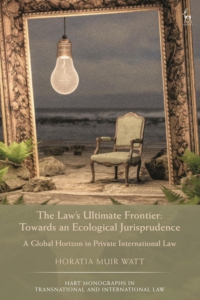Views
Book review: H. Muir Watt’s The Law’s Ultimate Frontier: Towards an Ecological Jurisprudence – A Global Horizon in Private International Law (Hart)
(Written by E. Farnoux and S. Fulli-Lemaire, Professors at the University of Strasbourg)
 Horatia Muir Watt (Sciences Po) hardly needs an introduction to the readers of this blog. The book published last year and reviewed here constitutes the latest installment in her critical epistemological exploration of the field of private international law. More specifically, the book builds upon previously published fundamental reflections on the methods of private international law already initiated (or developed) in her previous general course (in French) at the Hague Academy of International Law (Discours sur les méthodes du droit international privé (des formes juridiques de l’inter-altérité)), as well as on the contemporary relevance of private international law (“Private International Law Beyond the Schism”). Numerous other works, naturally, also come to mind when reading this book (see among many others, ed. with L. Bíziková, A. Brandão de Oliveira, D. Fernandez Arroyo, Global Private International Law : adjudication without frontiers; Private International Law and Public law).
Horatia Muir Watt (Sciences Po) hardly needs an introduction to the readers of this blog. The book published last year and reviewed here constitutes the latest installment in her critical epistemological exploration of the field of private international law. More specifically, the book builds upon previously published fundamental reflections on the methods of private international law already initiated (or developed) in her previous general course (in French) at the Hague Academy of International Law (Discours sur les méthodes du droit international privé (des formes juridiques de l’inter-altérité)), as well as on the contemporary relevance of private international law (“Private International Law Beyond the Schism”). Numerous other works, naturally, also come to mind when reading this book (see among many others, ed. with L. Bíziková, A. Brandão de Oliveira, D. Fernandez Arroyo, Global Private International Law : adjudication without frontiers; Private International Law and Public law).
The publication of a book on the field that this blog deals with would be enough to justify it being flagged for the readers’ attention. We feel, however, that its relevance to our academic pursuits warrants more than a mere heads-up and, while it would be unreasonable (and risky) to try to summarize the content of this engrossing and complex book in a blog friendly format, we would like to make a few remarks intended to encourage the readers of this blog to engage with this innovative and surprising work.
Transforming legal borders: international judicial cooperation and technology in private international law – Part II
Written by Yasmín Aguada** [1]– Laura Martina Jeifetz ***[2]. Part I is available here
Abstract: Part II aims to delve deeper into the aspects addressed in the previously published Part I. International Judicial Cooperation (IJC) and advanced technologies redefine Private International Law (PIL) in a globalized world. The convergences between legal collaboration among countries and technological innovations have revolutionized how cross-border legal issues are approached and resolved. These tools streamline international legal processes, overcoming old obstacles and generating new challenges. This paper explores how this intersection reshapes the global legal landscape, analyzing its advantages, challenges, and prospects.
Keywords: private international law, international judicial cooperation, new technologies, videoconferencing, direct judicial communications, Smart contracts, and Blockchain.
NUON-Claim v. Vattenfall: Pivotal or dud for collective actions in the Netherlands?
Written by Jos Hoevenaars (Erasmus University Rotterdam) & Eduardo Silva de Freitas (Erasmus University Rotterdam), members of the Vici project Affordable Access to Justice, financed by the Dutch Research Council (NWO), www.euciviljustice.eu.
On 9 October, the District Court of Amsterdam issued its final judgment in a collective action against energy supplier Vattenfall. This judgment was eagerly awaited as it is the very first judgment in a mass damage claim under the Dutch WAMCA procedure. The new framework for collective redress, which became applicable on 1 January 2020 (see also our earlier blogpost), has received a lot of attention in international scholarship and by European legislators and policy makers due to its many innovations and making it easier for consumers and small businesses to litigate against large companies. The most notable change in the Dutch act compared to the old collective action regime is the possibility to request an award for damages, making such proceedings attractive for commercial litigation funders. A recent report commissioned by the Dutch Ministry of Justice and Security (published in an English book here) found that most collective actions seeking damages brought under the WAMCA have an international dimension, and that all of these claims for damages are brought with the help of third party litigation funding (TPLF). Read more
News
Where do Children Reside? Where they are “at Home”
The Supreme Court of Canada has released its reasons for dismissing the appeal (which it did orally on December 9, 2024) in Dunmore v Mehralian, 2025 SCC 20. The narrow issue was the meaning of “habitual residence” for a child in the statutory context of the Children’s Law Reform Act (Ontario). The SCC had earlier explained that a hybrid approach to the meaning of habitual residence is to be used under the Hague Convention: Office of the Children’s Lawyer v Balev, 2018 SCC 16. In the convention, there is no definition of habitual residence. In contrast, the CLRA does provide elements of a definition of habitual residence (in s 22) though it leaves “resides” undefined. This generated the issue: under the statute, does the same hybrid approach apply or is the definition different because of the statute?
AMEDIP’s upcoming webinar: WIPO Expedited Arbitration on 26 June 2025 (in Spanish)

The Mexican Academy of Private International and Comparative Law (AMEDIP) is holding a webinar on Thursday 26 June 2025 at 14:30 (Mexico City time – CST), 22:30 (CEST time). The topic of the webinar is WIPO expedited arbitration: ADR and ODR in the era of technology disputes, videogames and e-sports and will be presented by Kiyoshi Tsuru and Óscar Suárez (WIPO) (in Spanish).
Public Review: New UN Economic Committee for Europe White Paper on Digital Product Passports & Critical Raw Materials for Batteries: Legal Conflicts and Principles for Cross-Border Cooperation
Legal fragmentation slows down the scaling up of the Critical Raw Materials-battery value chains to meet the demands of the green transition. Digital Product Passports (DPPs) should serve as an effective digital traceability tool for business compliance, rather than creating a green barrier.
UNECE and UN/CEFACT are proud to release our White Paper for public review, offering a deep dive into:


